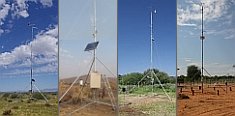|
|||||||||||||
 |



Weather data

A large number of automatic weather stations has been implemented in the frame of the BIOTA AFRICA project by the Namibian National Botanical Research Institute (NBRI) and the Group "Biodiversity, Evolution and Ecology" (BEE) of the University of Hamburg. The website offers hourly updates of data and graphs of a large number of weather parameters.

|
< back Subproject W02
Subproject Coordination: Dr. Jörg Szarzynski, Center for Development Research (ZEF), Div. Ecology and Natural Resources, Walter-Flex-Str. 3, 53113 Bonn, Germany
|
|
Major task of subproject W02 is the continuous analytical monitoring of hydrometeorological and biophysical parameters that effect local biocoenosis. Involving various stochastic and deterministic processes these components form an essential part of the manifold mechanisms originating and maintaining terrestrial biodiversity. The resulting data are provided to participating BIOTA working groups via the BIOTA-W02 website. Apart from the real time field monitoring an extensive database was established creating the basis for a comprehensive ongoing analysis of the spatiotemporal dynamics of climate in West Africa. Understanding the reasons for the significant variability of climate in West Africa is still a major challenge for scientific research, since e.g. the Sahelian drought affected great parts of the area in terms of ecological, economic, and societal aspects. Results from General Circulation Models (GCM), as often applied in frame of the above mentioned context, are essential to understand large-scale coherences, but do not necessarily match the requirements of regionally to locally orientated biodiversity research. Therefore BIOTA subproject W02 investigates the cross-scale linkage between local processes calibrated at field experimental sites to responses at the larger grid resolution. During the pilot phase most experimental field investigations took place at major study sites in Côte d'Ivoire. Additional measurement tasks came up with the BIOTA West extensions into Burkina Faso and Benin. Substantial progresses were achieved with regard to new cooperation partners and the successful linkage to the BMBF funded GLOWA Volta project. Based on experiences from the BIOTA West Africa pilot phase we can conclude that the prime contribution of climatological investigations within biodiversity research is to generate a multi-scaled scientifically sound framework derived by reliable experimental field measurements and a profound analysis of regional climate variability including vegetation dynamics and land cover/use changes. The latter aspect should be supported by means of upscaling procedures and dynamic spatial modelling. Concerning future scenarios and the development of sustainable management strategies it is important to know how land cover/use changes affect regional patterns of climate and biodiversity, and vice versa. Workpackages: WP1 WP2 |


 |
 Go to the WeatherNet
Go to the WeatherNet